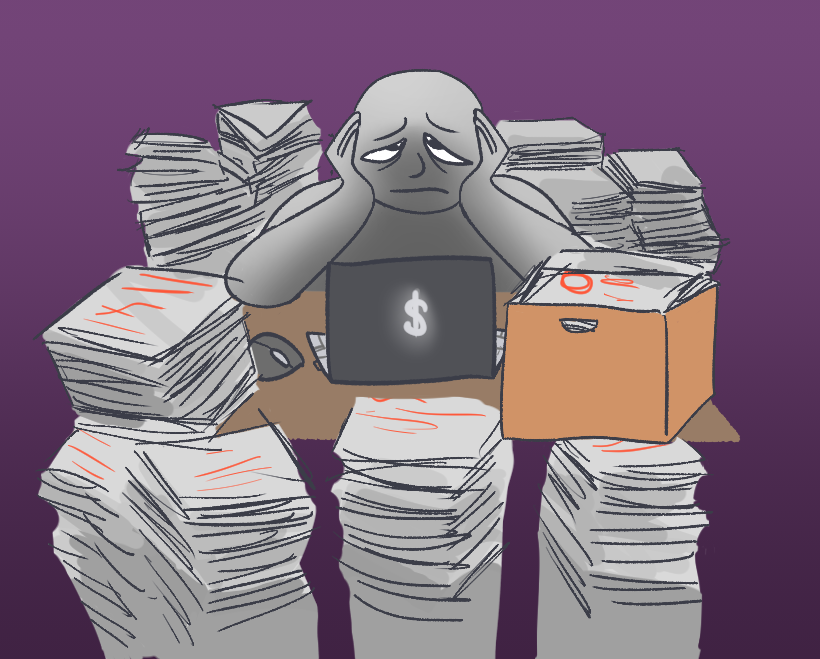Away with the shame and guilt: I’m taking a study break
The semesterly plague of throwing self-care out the window needs to be rethought in this increasingly challenging world.
The first sign that I put up in my hall as a first-year RA was a postcard of a lounging Tiger surrounded by the words, “The rest is just as important as the work.” At the beginning of a new semester, and for my residents beginning college, I thought it was an important message to keep in mind when the semester loses its fresh shine and most students feel overwhelmed by their work.
In a society that seemingly values work and output over all else, the decision to take time to rest seems to cause constant internal battles among students. It is saddening that this on-the-grind mentality is ingrained in the young people of our generation because it has taught us that results are held higher in importance than our own well-being.
It is an inherently capitalist ideal that hard work will lead to more desirable outcomes in life. This notion is understandably ingrained in us because it is believed to make us more successful in life. But, it is high time we ask ourselves: at what cost are we willing to achieve this elusive success?
Putting aside our mental health and well-being for the sake of productivity is counterintuitive and unhealthy. If our minds aren’t well taken care of through routine practices of rest, then the work that we do will be of lesser quality. According to research at Cornell Health, taking a break actually increases energy, ability to focus and productivity.
It seems that most of us have some sort of awareness that taking care of ourselves is important to our overall success, yet conversations surrounding the idea of rest are not prevalent because of the shame and guilt that come with actually putting the work down and taking a break. This performance-driven mindset tricks people into thinking that they must always be producing (in a work or school setting) to be successful. Especially here at Trinity, we are all so motivated to perform well academically, along with the extra activities we do that slowing down doesn’t even feel like an option. The urge to take a break or slow down is perceived as a failure through this lens but often is necessary.
The “go, go, go” mentality is something that we must actively work to change within our mindsets. The shame and guilt that comes with taking time for oneself are real and must be pushed back against to improve one’s quality of life. Even people viewed as extremely successful, like Michelle Obama, struggling to make the paradigm shift of health over wealth.
In her recent book, “The Light We Carry,” Obama uses the story of her father’s multiple sclerosis (MS) and the motorized chair and hydraulic-equipped van he used to get around as an extended metaphor for the fact that we must all find tools to help navigate through life. She stresses that we must understand that using our tools, whatever they might be, helps us be “better able to coexist with uncertainty,” and that we mustn’t be ashamed or feel less than for utilizing them in difficult times.
Reconnecting with nature, taking a walk, meditating, listening to music, calling a loved one, dancing or taking a 15 to 20-minute power nap are activities that Cornell Health suggests will help you reenergize in a purposeful way. As a person with a tight schedule, like most of us, I find that creating specific times in my Google Calendar to intentionally not do work is very helpful and allows me to be intentional with my time. Additionally, meditation apps like “Smiling Minds” or “Headspace” are particularly useful to cater your mindfulness to your current state of mind. Another useful website for all things self-care-related is Press Pause, which suggests a variety of different tools that can be used to slow down an overwhelmed mind.
While most of us are probably still in the honeymoon phase of the semester, let’s remind ourselves now that we can and should lean on our tools to help us keep going. It is important to keep in mind that the guilt of taking time for yourself is merely a condition that comes with the on-the-grind mindset which you must slowly break down to then create a happiness-based mindset. Let’s practice inner kindness and allow ourselves to embrace our tools.

I am an International Studies and Political Science major with a minor in Spanish. My passions lie in studying methods of peaceful and diplomatic interactions...




Betty Curry • Jan 30, 2023 at 6:21 am
Love this,Emma!